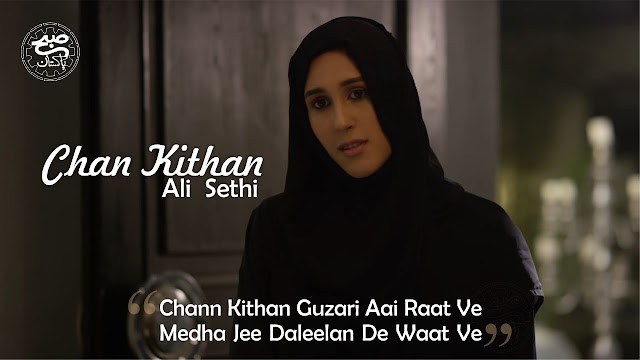These are “dohras” or “दोडा़” in Saraeki which is what we call “tappe” in Punjabi. These are couplets which rhyme towards the end, and he first line has no connection with the second. Its only purpose is to serve the rhyming purpose. Here you go!
चन कित्थाँ गुज़री आही रात वे
मेंढा जी दलीलाँ दे वात वे
She is calling him moon (chann) and asking him where did he spend the night!
Saying that because he didn’t come home last night she has been reasoning (daleelaan – दलील देना) with herself as to why and where was he and was he with another woman or something was wrong and so on and so forth.
कोठे ते पिड़ कोठ्ड़ा माही कोठे सुक्दा घा भला
आशिक़ाँ जोड़ियाँ पोह्ड़ियाँ माशूक़ाँ जोड़े राह भला
Kothay te pidh kothda in every couplet means छत के ऊपर छत. In Punjabi kottha means terrace. So terrace upon terrace and on the terrace grass is drying. ( ghaa- grass, sukhda- drying)
Aashiq here serves a gender perspective, aashiq is male and men break (phodiyaan) hearts where as women or maashooq bring hearts together. we can interpret it as aashiq being used in a loose sense, such as ashiq fek or people who carry their hearts on their sleeve and fall in ‘love’ every instance but aren’t serious where as maashooq is someone who is in serious love and so they bring hearts together.
or you can interpret it as
“paudiyaan” which means stairs, so she says ashiq build steps or stairs, and mashooqs built roads or rather they pave the way for love
कोठे ते पिड़ कोठ्ड़ा माही कोठे सुक्दी रेत भला
असाँ गुधाइयाँ मेंढियाँ तूं किसे बहाने वेख ज़रा
Ret- sand so sand is drying on the terrace
Asaan- we or I gundhiyaan mendiyaan- braided lil braids on the head very typical of Punjab. We call it middiyaan, so she is saying I made braids for you, at least come kisi bahaane and see me.
कोठे ते पिड़ कोठ्ड़ा माही कोठे ते तन्दूर भला
पह्ली रोटी तुँ खावें ओ तैंडे साथी नस्दे दूर भला
Tandoor on top of the terrace
When you come home with friends as men used to in olden times she is saying she wil cook and first (pehli) roti will be for him and (tainde saathi) and your friends can run away (nass is to run). Basically I don’t give a damn about your friends as long as you have eaten the first roti.
कोठे ते पिड़ कोठ्ड़ा वे माही कोठे बैठा काँ भला
तूँ ताँ मैं कूँ भुल गियों ए मैं अजे वी तैडो हाँ भला
Kaan is crow, so crow is sitting on the terrace.
You might have forgotten me (bhul giyon) but I am yours even today. (Aje- even now, taindi-Teri or yours)
कोठे ते पिड़ कोठ्ड़ा वे माही कोठे दे विच बारियाँ
हुण ताँ वापस आ माही तूँ जित्तियो ते मैं हारो आँ
Baari means windows, so saying terrace has windows.
Hunn is now, jitiyon comes from jeetna, so saying now come back, you win I lose!
कोठे ते पिड़ कोठ्ड़ा वे माही कोठे सुक्दियाँ तोरियाँ
कालियाँ राताँ जाग के मैं नप्पियाँ तेरियाँ चोरियाँ
Toriyaan is the vegetable tori so they are drying on the terrace
Nappiyaan- means to nab in this case more like stumbled on to your choriyaan meaning i know what you have been up to and that has led to sleepless dark nights, or the other way round that in your absence I have had dark sleepless nights and led me to stumble on to your antics.
कोठे ते पिड़ कोठ्ड़ा वे माही कोठे सुक्दे बेर भला
होर मैं तैनूँ की आखाँ क्यूँ लाई ए इत्नी देर भला
Ber is ber the fruit and it is drying
Hor means aur when we say hor kee haal chal? Aakhaan means to say, so she is saying what more can I say to you? Why did you take so long (der) ?
कोठे ते पिड़ कोठ्ड़ा वे माही हेठ वगे दरिया
बेश्क रुस्सिया रहा मैथों हिक वारो मुड़ के आ भला
Het means neechay, such as hetaan kursi rakhi hai, which means a chair is kept on the lower floor. So saying a river (dariya) flows (vaghe) besides the terrace
Russna means gussa ya naaraaz hona. Maithon means mère se, so saying beshak stay mad at me but ik baari (once) come back.
Another version
“toriyaan” but he says “…kaliyaan (not kaali but kalli means alone, so I spent lonely nights) raataan jaag ke ginniyaan teriyaan duriyaan” meaning I have spent lonely nights counting how far you are
kothay baitha kaan (crow) bhala
Main ban jaavaan maachli (fish) tu baglaa (crane is closest, basically the bird that swoops down and grabs the fish) ban ke aa bhala. So be that bird and take me away.

Amazing
ReplyDeleteBrilliant work mate! Do continue sharing the meaning of other folk too. Thank you so much!
ReplyDeleteThank you !
ReplyDeleteThank you so much. This is so moving.
ReplyDeleteThank you so much!
ReplyDeleteBeautiful ❤️
ReplyDeleteThanks
ReplyDeleteDil jeet liye dost...You revealed to me that the lyrics is to some extent better than the soothing music and the mesmerizing young voice...
ReplyDeletenicee!
ReplyDeleteWhat is meant by tooriyan at the last?
ReplyDeleteVegetables
DeleteThank you so much, your work is so brilliant and helpful to me to under stand the beauty of this evergreen folk song..
ReplyDeleteThanks for explaining meaning of this great traditional folk song of Punjan
ReplyDelete*** read Punjab
ReplyDeletewow
ReplyDeleteRemarkable translation.hats off...
ReplyDeleteRemarkable translation.hats off...
ReplyDeleteसुरेंद्र कौर जी की आवाज़, शहद जैसी है, कई बार दिल करता है कि उनके गाने सुनते ही रहूँ दिल भरता ही नहीं है🙏🏽🙏🏽
ReplyDeleteThanks - best one I came across so far. Great work.
ReplyDelete❤️❤️
ReplyDelete